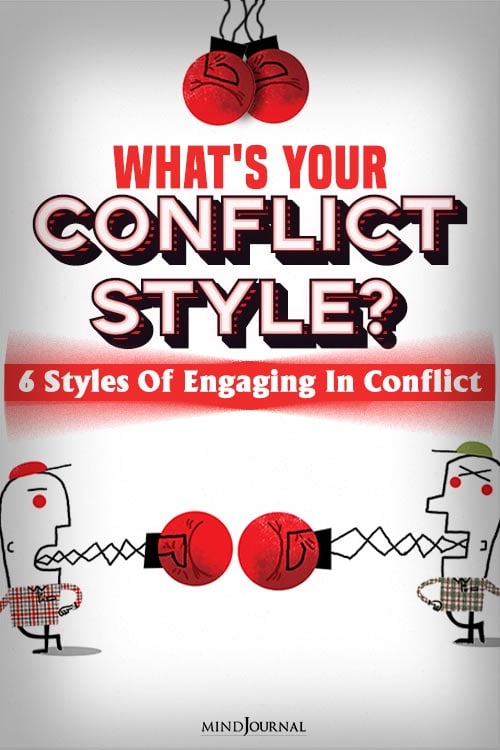The way you handle arguments and disagreements can say a lot about who you are as a person; everyone has their own style of approaching and grappling with difficult conversations, including you.
Key Points: Many people have one particular "conflict style" that informs how they approach most disagreements—they may avoid all conflict, for example, or have a tendency to attack. While there is likely a genetic component to conflict styles, they are deeply informed by sociocultural influences, education, and past experiences with disagreement. Identifying your dominant "conflict style" and where it came from—with the help of a therapist, if necessary—can help you unlearn unhealthy approaches to disagreement.
Even though conflict is a normal part of our human experience, many of us don’t give a lot of critical thought to the ways we approach conflict and difficult conversations. Whether we realize it or not, each of us has a style of engaging conflict. Digging into our personal styles can be an enlightening experience that leads to greater self-awareness. It can also help us set new goals for personal growth.
Six Styles Of Engaging Conflict
- Which style, or styles, do you identify with most?
- If you identify with more than one style, what situations determine which style you lean into?
1. Avoidants:
People who are avoidants tend to run for the hills at any sign of trouble. They might feel deeply uncomfortable even at the slightest mention of a raised voice. Most or all conflict feels like a threat, and avoidants will want to retreat and may feel a sense of panic when they are not allowed to.
Many times, conflict for an avoider festers and will go nuclear—either implode or explode because it’s not dealt with in a timely manner.
Related: Why Your Man Always Seems To ‘Shut Down’ During An Argument
2. Brawlers:
Brawlers like to throw their dukes up and often blur the line between fighting fair and swinging below the belt. Often intensely competitive, brawlers can also perceive intense threat in conflict; that’s why they want to win and overpower the threat before it gets the upper hand.
Brawlers can cause a lot of damage to themselves and others because in the heat of the moment they aren’t thinking about the impact of their words and actions.

3. Conciliators:
While being conciliatory is not necessarily always bad, conciliators tend to want to rush through difficult emotions and uncomfortable situations, resolving the issues as quickly as possible—even if that means putting a “band-aid” on the matter.
While conciliators mean well, the haste to “fix” can lead to drastic long-term consequences for communication and relationships. It can also have negative consequences for the conciliator, who might sacrifice themselves or their needs in order to make the conflict go away.
4. Debaters:
Some of us tend to intellectualize conflict and dive into lengthy ideological dialogues when we experience conflict. While healthy debate is important, there are two risks in being a debater: 1) to get so heady with a set of issues that we ignore our emotions and lived experience, and 2) we focus on winning the debate and being the smartest person in the room, ignoring the fact that not everyone is skilled or trained in debate, and not everyone is good at having these conversations in the heat of the moment.
Unless both parties have agreed to a formal debate with ground rules, debaters can lack vulnerability, get lost in technicalities, and lean into power imbalances that are not helpful.
Related: 5 Ways To Stay Calm During An Argument With Your Spouse
5. Devil’s Advocates:
Devil’s advocates value disagreement for disagreement’s sake. In one sense, this is a healthy way to approach conflict; a healthy devil’s advocate who works from a place of empathy uses this ability to bring up issues or perspectives that need to be considered.
An unhealthy devil’s advocate will often lack vulnerability, like a debater. They may never be willing to come to any kind of consensus because they enjoy being a contrarian. This is often highly frustrating to the people around them and can erode relationships.
6. Cooperatives:
Understanding that conflict is a natural part of life and resolving it is uncomfortable but necessary, cooperatives take their time with conflict. They seek to humanize the “other side,” and even if they can’t reach a consensus or agreement, they do what they can to carefully work through things with all parties involved.
They practice emotional regulation so they don’t have to run away or fight when they experience uncomfortable feelings. They are not afraid to share hard truths or set boundaries, and they seek the health and safety of the long-term relationship.
Where Do Our Conflict Styles Come From?
While there’s no way to break down an exact ratio of nature vs. nurture in this arena, there are many factors that inform our conflict style. These factors include:
Nature
- Personality and body chemistry
Nurture (Socialization)
- Social location—where you are in the world (race/class/gender/ethnicity/ability) and the complex cultural influences that impact these identities
- Family systems—the roles you play(ed) in your family of origin
- Past experiences with conflict—either positive, negative, or traumatic
- Education—what we are taught, directly
- Modeling—what we learn indirectly from parents, role models, and our community
- Media consumption—what we watch and listen to
- The stakes—the impact that conflict or set of issues has on our lives
Are We “Stuck” With Our Conflict Style?
No! That’s the good news. Our conflict styles are largely learned—which means they can be unlearned. Realizing that we have an unhealthy or unhelpful conflict style can be humbling. We can’t change the past, but we can create better patterns for ourselves and our relationships moving forward.
Related: 10 Tips For Constructive Arguments With Your Loved One
Once you are aware of your conflict style(s), take some time to:
1. Unearth the personal history that caused you to learn that style. Therapy can be a vital help in this process.
2. Identify which new style(s) you would like to learn or lean toward.
3. Work on building new skills that align with your goals.
For more helpful free tools and resources, check out bravetalkproject.com. This article was adapted from Brave Talk: Building Resilient Relationships in the Face of Conflict (Broadleaf Books, 2020).
Contact Melody at melodystanfordmartin.com. for such informative articles.
Written By Melody Stanford Martin Originally Appeared On Psychology Today











Leave a Reply